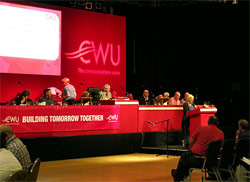Special Leave And Menopause Discussed At CWU Conference
Derek Maylor NW BTU Health & Safety Co-ordinators Committee Chairperson reports from CWU Telecom and Financial Services Conference in Bournemouth Wednesday 25th May 2011:
 Liverpool Clerical Branch went to the rostrum to note that menopause is an unavoidable change that every woman will experience and it affects each woman differently, for some it can be a difficult time whereas less so for others. On occasions the physical, mental and emotional effects can disrupt daily life with common effects such as increased stress, insomnia, fatigue and memory problems.
Liverpool Clerical Branch went to the rostrum to note that menopause is an unavoidable change that every woman will experience and it affects each woman differently, for some it can be a difficult time whereas less so for others. On occasions the physical, mental and emotional effects can disrupt daily life with common effects such as increased stress, insomnia, fatigue and memory problems.
We request that the T & FS work with the negotiating team and the employers to create such a policy.
Within some of our employers there are no references to the menopause in any of their procedures particularly those on Attendance, Performance and Discipline. These should recognise the potentially debilitating effect so we are to negotiate with employers for provisions to be made which recognise and support women through it.
In moving proposition 41, Diane Strode from Liverpool District Clerical Branch said:
"I first heard this proposition at the Women's Conference of February this year, and thought it was a great proposition that should be brought to a wider audience.
Approximately 50 per cent of us on this planet are women. All of those, sooner or later, will go through the menopause. According to the NHS website, it is estimated that 8 out of 10 women in the UK experience symptoms leading up to menopause. Of these, 45 per cent find their symptoms difficult to deal with.
Without treatment, most menopausal gradually stop naturally. This usually happens 2 to 5 years after the symptoms start, although some women experience symptoms for many more years. Self help advice for managing menopausal symptoms include lowering stress levels. The last thing a woman needs to be worried about is keeping her job during what can be, for some, a difficult time.
When I asked in my workplace what provisions and procedures where there for dealing with absence/disciplinary for women going through menopause - I was told there wasn't any, it would be dealt with on a case by case basis. When pressed the employer said they would probably use the same policy that is used for pregnant women. I asked to see this policy......I'm still waiting.
My employer is a massive company with offices all over Europe.
We would like to see all employers put a policy in place specifically to recognise and help women going through menopause. That on production of a letter from their GP stating that they are going through menopause this policy would then go into effect.
We would like to see triggers in place so that absences relating to menopausal symptoms are not escalated to disciplinary. We would like to see the same consideration when dealing with performance issues, where past performance has been good.
For our workplace to have a policy regarding pregnancy - which not all women go through, and not one for menopause - which affects all women - is an oversight that needs addressing."
The propostion was carried with no oposition.
Conference was also concerned that an increasing number of members are being routinely refused paid special leave for hospital appointments which cannot be made outside working hours despite previous assurances. We need an unequivocal directive issued to all employers on paid special leave taken for medical reasons.
The Co-ord recognises that industry wide there is growing concern over work related stress and the possible devastating effect on members and their families. There is an increasing pressurised work environment in telecommunications which is becoming excessive and a direct cause of stress related illness. Furthermore this is reportable to the DWP and accepted as an industrial injury/disease.
The Executive were instructed to ensure employers adhere to their industrial injury policies and treat all industrial injuries equally; this to include joint incident/accident investigation independently and with no pre-determined bias.
Source: Derek Maylor